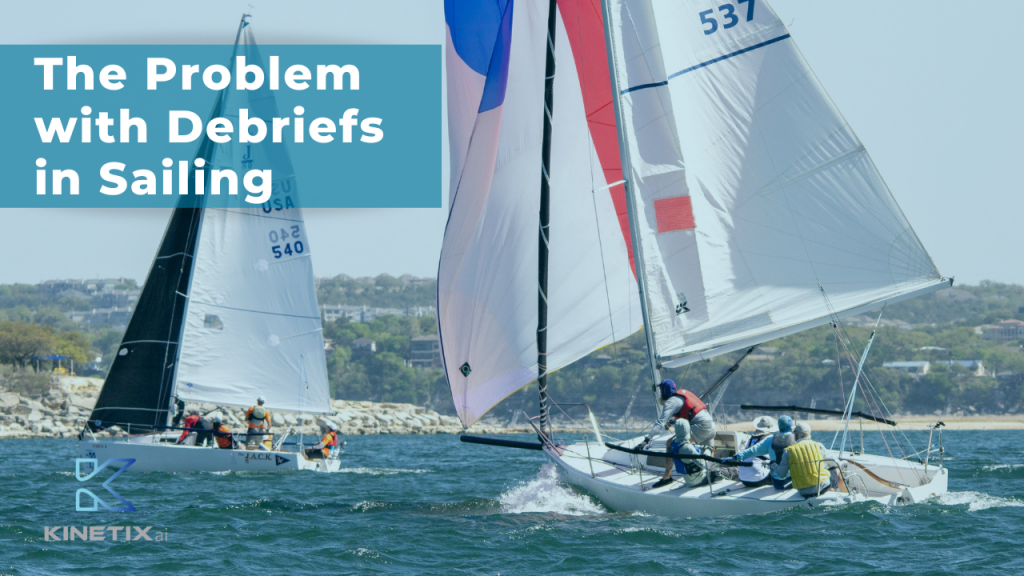
It’s Not the Bow’s Fault!
Here’s the scenario: you’re a Farr 40 with a crew of 8. You go into a gybe, the bow person takes too long to get the new guy in the jaws of the pole. The gybe ends up being too slow, the boat decelerates and your competition pulls a boat length ahead of you.
What happens next?
Likely some yelling.
The skipper yells from the back of the boat that the bow person needs to move faster to get the pole attached. (It’s always the bow’s fault!)
The bow person gets frustrated and yells back that something was stuck. (It’s fantasy land’s fault!)
Two hours later, when you’re back at the dock, you’re sitting around the cockpit discussing the gybe, trying to remember exactly what happened and why.
The bow person had too much resistance and couldn’t get the guy into the jaws, but where did that resistance come from? Was someone standing on the guy? Did the guy trimmer pull it in too soon? Did the bow person just not pull enough slack forward before the maneuver?
So much happened that day, and now you’re trying to piece together the sequence of events from two hours earlier with 8 different points of view. The bow person feels put on the spot and gets defensive. Everyone’s just a little frustrated and the skipper wants to keep the peace, so you say screw it and go into the club for a drink.
Feedback is Essential
Ultimately, the issue for the team is not whether someone pulled a line too soon or too late. The issue is how the team gave feedback to each other.
Feedback is an essential part of sailing training and coaching. Without it, you can’t improve. But how we give and get feedback determines how well the information is received, understood and implemented. It also plays a major role in how motivated a sailor stays long-term.
There are a few ways that sailors get feedback. If you’re part of a structured team with a coach, you’re (hopefully) getting a proper chalk talk that involves some video, a white board, little magnetized boats, and a lot of bar karate.
But for the rest of the sailing world, feedback–if you get it at all–comes usually in one of two forms:
- In-the-moment feedback (often in the form of yelling over the chaos)
- Round-robin debriefs
If you’ve sailed long enough, you’ve experienced both of these methods, and you know they have some limitations.
In the scenario above, the skipper yelling from the back of the boat doesn’t take into account what the bow person was actually dealing with in that particular moment or what caused them to be delayed. Stakes are high, and things are moving fast. Which means emotions run high. The bow person feels attacked, and we end up with the perpetual blame game between the front of the boat and the back of the boat.
Round-robin debriefs are certainly calmer, but they rely on memory, which could be fuzzy an hour or two after that gybe. Round-robin debriefs also risk turning into finger-pointing sessions, and when people’s defenses go up, they’re not open to receiving feedback.
When someone’s viewpoint is limited, their feedback is inherently biased.
If you want to take the blame game out of your debriefs and have feedback sessions that actually improve team cohesion, you need to use an unbiased source–video.
Video gives you facts. Video doesn’t rely on memory. Video can be watched when you’re warm, fed and emotions are calm.
Combine video with boat data and GPS tracking, and you suddenly have a powerful tool that tells you not just what happened, but why it happened. It helps sailors understand why their role matters and how their role fits into the system as a whole. It shows you the impact of even tiny mistakes and helps you identify where to focus your training. And–wonder of wonders, miracle of miracles–it could even unite the bow and fantasy land.
But we’ll never give up the bar karate.
Data-Driven Sailing
You can learn more about how to take the bias out of your sailing training in these interviews with some of our favorite coaches and analysts. We learned a ton!
Want a tool that will help you use video and data easily? Schedule an appointment to learn more about Kinetix AI.

